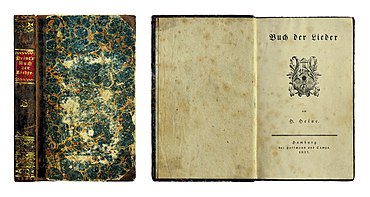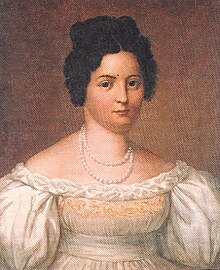Book of Songs (Heine)
The Book of Songs was Heinrich Heine's first large volume of poetry, in which he summarized all of his poems known at the time. The first edition was published in Hamburg in 1827 by Hoffmann and Campe (fig. Right).
prehistory
The book of songs contains hardly any new poems, but rather represents a chronological collection of already published ones. In a letter of November 16, 1826 to Friedrich Merckel , Heine writes:
"Some friends penetrate it, that I should a select collection of poetry, in chronological order and strictly selected, edited, and believe that they just as popular as the Bürgersche , Goethe , Uhland will be etc. Varnhagen gives me some rules in this regard. I would take up part of my first poems [...] I did not want to charge a shilling for this book, the cheapness and other requirements of becoming popular would be my only considerations, it would be my pleasure to show bricklayers and dummies that I should help know, and this book would be my main book and give a psychological picture of me - the gloomy, serious youth poems, the "Intermezzo" connected with the "homecoming", pure blooming poems, e.g. B. those from the " Harzreise ", and some new ones, and finally all the colossal epigrams .
Just hear from Campe whether he does not dislike such a plan, and whether he promises paragraphs in such a book - it would not be an ordinary collection of poems "
The publisher Julius Campe was against the book at first, but later changed his mind and published the book.
structure

The book of songs consists of several cycles :
- Young sorrows , consisting of dream images , songs , romances and sonnets
- Lyric interlude
- the return home
- From the Harz trip
- The North Sea , consisting of the first cycle and the second cycle .
All cycles had previously appeared under different titles. So comes from:
- Young suffering: poems , Berlin 1822, Mauersche Buchhandlung
- Lyrical Intermezzo: Tragedies, together with a lyric interlude , Berlin 1823, with Ferdinand Dümmler
- The homecoming, from the Harz journey, the North Sea, first cycle: travel pictures, first part , Hamburg 1826, Hoffmann and Campe
- The North Sea, Second Cycle: Travel Pictures, Second Part , Hamburg 1827, Hoffmann and Campe.
In total, the book of songs contains 237 poems. Just eight of them were new. Many of the poems had appeared in one of the above publications in out-of-cycle journals prior to printing. Some had already been printed four times.
Nevertheless, the book of songs was a great success and was published in numerous new editions.
content
The book of songs includes poems between 1817 and 1826 Heine's early work. It was to be almost twenty years before the second large volume of poems, Neue Gedichte, appeared in 1844 ( the third and last followed in 1851 with the Romanzero ). From the political satire typical of Heine's later works , such as in Germany. A winter fairy tale , there is not much to be found in the book of songs. Instead, 142 of the 237 poems deal with unhappy love . Heine's feelings about his cousin Amalie and later about her sister, who is seven years younger, both daughters of Salomon Heine , are cited as an explanation . Heine commented on such an interpretation in a letter to Karl Immermann on June 10, 1823:
- “There is only one thing that can hurt me most painfully if you want to explain the spirit of my poetry from history (you know what this word means) from the author's story. It hurt me deeply and bitterly when I saw yesterday in a letter from an acquaintance how he wanted to construct my whole poetic being from gathered little histories, and dropped unpleasant remarks about impressions of life, political position, religion, etc., uttering something similar in public would have made me quite outraged, and I am heartily glad that this never happened. However easily the story of a poet could provide information about his poem, how easily it could really be proven that political position, religion, private hatred, prejudice and considerations often influenced his poem, one never has to mention this, especially not during the lifetime of the poet Poet. The poem is deflowered, as it were, the mysterious Schleyer of it is torn apart when that influence of history which one can prove is actually present; you spoil the poem when you have pondered it wrongly. And how little is the outer framework of our history matching our real, inner history! Bey at least never paste it. "
The book of songs also contains political poems, such as B. "Berlin". Donna Clara , for example, is a critique of contemporary anti-Semitism . The most famous poems include The Grenadiers , the Loreley (“I don't know what it should mean”), The Old, Evil Songs and Belsatzar.
censorships
Heine had problems with censorship all his life - even with the Book of Songs . Here, however, even less for political reasons than for the use of words and phrases that were considered too obscene. For example, the beginning of a poem that was still in the first edition became
- On your snow-white bosom
- I've laid my head
was called later
- On your snow-white shoulder
- I leaned my head
The poems were also criticized for being too vulgar. An example with a particularly large number of such expressions is the fresco sonnets Gieb her die Larv ', I want to mask myself now.
pads
After the first edition in 1827 there were twelve more. Up to the fifth edition, Heine had done post-processing every time. The editions appeared:
- 1827
- 1837
- 1839
- 1841
- 1844 (last edition revised by Heine)
- 1847
- 1849
- 1851
- 1851 (miniature edition)
- 1852 (miniature edition)
- 1853 (miniature edition)
- 1855 (miniature edition)
- 1876 (miniature edition - 40th edition)
Significance for the present
In Heine (complete) editions of the present, including the very important Düsseldorf Heine edition , the early poems are usually always referred to under the term “Book of Songs”. Poems not included in the Book of Songs can be found in the appendices. After the older publications, the poems are no longer sorted.
literature
- Heinrich Heine: All works in four volumes. Volume 1, Gedichte, 6th edition 1992, Artemis & Winkler Verlag Munich, pp. 849-879.
- Bernd Kortländer : "I am a German poet". Love and misery in Heine's "Book of Songs" . In: Heine Yearbook 2006. Metzler, Stuttgart-Weimar 2006, pp. 59–73.
- Ingo Müller: Mask play and soul language. On the aesthetics of Heinrich Heine's book of songs and Robert Schumann's Heine settings (= Rombach Wissenschaft), 2 volumes, Baden-Baden 2020. Volume 1: Heinrich Heine's poetry aesthetics and Robert Schumann's song aesthetics , ISBN 978-3-96821-006-3 . Volume 2: Heinrich Heine's book of songs and Robert Schumann's Heine settings , Baden-Baden 2020, ISBN 978-3-96821-009-4 .
Remarks
- ^ Letter of November 16, 1826 to Friedrich Merckel, taken from the HHP
- ↑ The lotus flower scares full text at Wikisource
- ^ Letter of June 10, 1823 to Karl Immermann, taken from the HHP
- ↑ Donna Clara . Full text at Wikisource
- ↑ On your snow-white bosom . Full text at Wikisource
- ↑ Give the larva, I want to mask myself now . Full text at Wikisource
- ↑ Note: Heine changed little here in his own words and received the chronological order of the first edition. Heine: “Just as I didn't change the sequence of times, I changed the poems themselves. Only here and there, in the first section, were a few verses improved. To save space, I have omitted the dedications of the first edition. ”From the foreword to the second edition in Heinrich Heine: Book of songs Germany, a winter fairy tale and other poems. Winkler Verlag, Munich 1982, ISBN 3-538-06529-2 , p. 46.
- ↑ Note: According to Heine's own words, not looked through. Heine: "Unfortunately, I could not devote any particular care to the fourth edition of this book, and it was printed without reviewing it beforehand." From the foreword to the fifth edition in Heinrich Heine: Book of Songs Germany, a Winter Tale and Other Poems. Winkler Verlag, Munich 1982, ISBN 3-538-06529-2 , p. 51.

